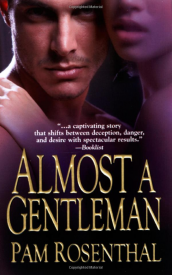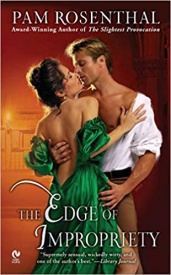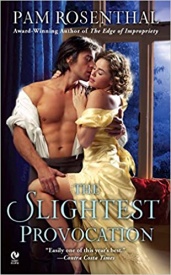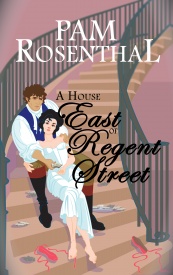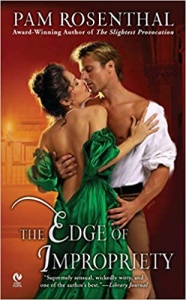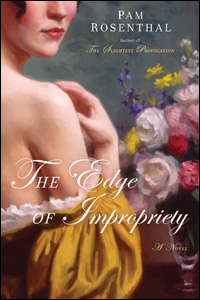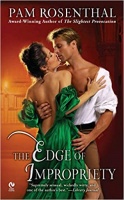The Edge of Impropriety
Part of Pam Rosenthal's Historicals Collection
Widow of an earl, popular society novelist — Marina Wyatt works hard to keep her life organized and her secrets to herself. Though if a new young lover every Season keeps her in the public eye and helps sell her books, all the better.
What might not be better, however, is Marina’s growing involvement with Jasper Hedges, noted classicist and art authority: a man of controversial opinions, unpopular ideals, and a closely-guarded past of his own.
Still, two experienced adult people know how to be careful, don’t they?
Where’s the harm in a few hot midnight meetings? How hot is too hot? How close can two scarred, ardent souls get to each other without hurting the innocent — or pitching over the edge of impropriety?

Read an Excerpt
The Edge of Impropriety
Excerpt
Jump to Ordering Options ↓
The story behind the story…
In a novel of connections lost and regained…
To celebrate The Edge of Impropriety winning Romance Writers of America’s 2009 RITA® award for Best Historical Romance, I’m posting the novel’s prologue in its entirety.
Italy, Lake Como
Spring, 1818
The baronet’s rented villa faced onto the shore. Light from the lake’s surface bounced and rippled against the drawing room’s painted ceiling. A tiny child crooned a nonsense song as she wove her way among the other four figures in the room.
An English lady and gentleman — she elegantly willowy; he lanky, broad-shouldered, rumpled — gazed wordlessly at a pair of beautiful adolescents, while the younger couple — they were Greek — bore the scrutiny with the same patience they’d exhibited since having been carved from marble some twenty-odd centuries before.
The child traced curious fingers over the fluted draperies of the girl statue’s tunic. The lady sighed. As one ought, in the presence of antique glory.
“Lovely,” she breathed. “So austere, so pure in their marble whiteness, so civilized.”
The gentleman laughed. “So cheap.”
“Cheap?”
“Indeed. Marble’s cheap in that part of the world. These are copies of bronze originals. The Greeks preferred their sculptures in bronze, colored and set with jewels for eyes. Very flash, the ancients were.”
“You’re teasing me.”
“Upon my word I’m not.”
His eyes were an intense blue in a sunburned face. His thick brown hair, bleached a dark sandy color by a relentless Mediterranean sun, was in serious need of cutting.
“The bronze was mostly melted down for nails and cannon balls — oh, and coin: a Roman general might pay his soldiers in melted statue. But they had such an abundance of marble, we find it everywhere — with its paint washed off, of course — and we’ve made rather a cult of classical white purity. The marble of the Parthenon was very likely painted in red and blue.”
She pouted, partly from disappointment, and partly — he knew — because the expression was as becoming to her as it had ever been. He watched the pout relax itself into a smile, heard it bubble into a laugh. “Still the scholar. And now a teacher, an authority.”
Her voice deepened now, as she moved forward to stroke the long, tense line of his jaw. “I remember you as rather more the student.”
Her eyelashes cast scalloped shadows over beautifully smooth cheeks as her bright hazel gaze moved along the length of his body. “An apt one. Alert, ready…”
“Fifteen years ago,” he murmured.
“I’m pretending I didn’t hear you say that.” The eyelashes flickered downward. “Ah yes,” the caressing voice had dropped to a low-pitched whisper. “Well, some things don’t change, do they?”
Some things did not. He sucked his breath through his teeth. No point denying the obvious.
No matter, either. He’d go take a long, brisk walk by the shore of the lake and that would be the end of it. Still, no reason not to enjoy the moment. The best consolation for the loss of one’s impetuous first youth must be this connoisseur’s appreciation of the pulls and tightenings, quickened sensations, thrilling pathos of unsatisfied desire.
Her skin had flushed to a dark pink. Damask rose. No — he felt his nostrils flare — musk rose. The passing of fifteen years had rendered his sister-in-law’s beauty earthier. She must feel the same slow, aching pleasure he did.
At least he hoped so. Because it was the only pleasure they’d be taking from each other this time.
She dropped her hand and he took a step backward.
“You’ve been avoiding me all week,” she said. “This is the first time I’ve been alone with you since your arrival.”
He inclined a square chin in the direction of the child, who’d walked around behind the girl statue. “We’re not alone.”
“No, of course not. But Sydney’s so excessively capable of amusing herself, I’d almost forgotten she was with us. Odd, isn’t it, in one so young?”
“Not so odd. I was like that.”
“And still are. Whereas both John and I require constant attention and novelty.”
“I can remember,” Jasper said, “how very prepossessing John was as a boy — precisely the sort of young gentleman a baronet would want for an heir, while I was quite content to remain in the background in the event of inconceivable calamity. The arrangement left me lots of time for reading, long walks, and wild fancies.” He grinned. “That was before I learned that a second son had to make his own way in the world.”
The grin remained upon his face perhaps an instant too long before he began to speak again. “Yes. Well. So. Have you and John succeeded in amusing one another for this past… hmm… this past unspeakable number of years?” Perhaps he shouldn’t have asked. What he’d observed between them this week hadn’t been encouraging.
“Sometimes. Not very often. The amusement comes and goes. I expect it needs to, for there to be any novelty in it. We spend a good deal of money on novelty. More than we can afford, I fear — on things, and on people as well.”
Her eyes flashed for a moment — with shame, he wondered, or a certain pride in having gotten what she could from the situation she’d found herself in?
“Perhaps,” she continued, “I should have run away with you back then.” She shrugged. “I do enjoy travel — Constantinople would have been lovely. Of course, no one traveled during the war years but a brave few like you. Yes, I should have…”
He welcomed the laughter that had overtaken him. “Be reasonable, Celia. You’re imagining yourself a Lady Elgin — caravans of baggage, tents like miniature palaces, torchlit regattas on the Bosporus. It wouldn’t have been like that for us; I was a foolish boy to propose it, with no notion whatsoever of the …”
Danger, he’d been about to say. Pirates, brigands, petty and not so petty chieftains setting up their own little island or mountain kingdoms in rugged island pockets of a sprawling Ottoman Empire.
Leave it alone, he told himself. Her modish popular misconceptions of antique art would be nothing compared to her Byronic oriental fancies — especially these days, with her life settled into routine and her husband running to fat. The Albanian costume Jasper had brought would never fit his older brother; he’d make him a present of a nice old rug instead.
He wasn’t accustomed to attending much to his own looks. A revelation then, to see himself this week through Celia’s veiled and not so veiled glances, to contrast the person she seemed to see with the confused, love-struck young scholar of fifteen years before. Catching his reflection in a pier glass, a window against a night sky, or the lake in a moment of glassy stillness, he’d wondered at the rangy, brown, tousled-headed fellow staring back at him, long bones and attenuated nerves sheathed in lithe muscle. A stranger, even to himself.
A romantic adventurer. A novelty.
No, Celia, not this time.
John would soon be back from the boat dock. If Jasper were to ask the important question, he’d have to do it quickly. As Celia was very well aware, even as she made him work to get the opportunity, in her eagerness for his attention. Or had Jasper been courting her attention more than he liked to admit?
Pensively, she gazed at the pair of statues. “Well, they’re lovely, in any case. The boy’s an archer, I gather, or some sort of athlete. And the girl?”
“A young Aphrodite. But as for the boy — oddly, he’s her son, Eros — Cupid, if you will, though not a chubby, simpering Italian version. The nubs on his shoulders are the remnants of wings — he’s not running; he’s flying. Yes, I know he appears the same age she does. But then, the gods don’t age as we do.”
She looked away.
“I think,” he said, “that they’re the work of the same hand. It’ll be a great pleasure to send them home to Athens, much as I’ve loved having them with me — they’re the achievement, I suppose, of all my wanderings.”
“How strange,” she said, “I’ve never gone anywhere, and yet my achievement is also a girl,” she nodded at Sydney, who’d squatted down to examine the kneeling Aphrodite’s sandal, “and a boy.”
A boy, yes.
Yes, finally. A boy. He’d be fourteen now.
Jasper willed himself not to let his voice tremble. “I must own that I’m not able to picture what he looks like. A pity you have only that single old miniature with you, of him still in petticoats.”
Her smile had a hint of mockery in it. “He’s as beautiful as your statues. When we had a family painting done last year at Wheldon Priory, the artist had to restrain himself from making Anthony the center of the composition. I felt sadly neglected — quite the unnatural mother in my vanity.”
“The miniature is accurate, then. He looks like you.”
“As I’ve looked in certain moments. I expect you’d recognize something of that in him, I wonder how you’d take it. Anthony has your family’s height, though.”
Anthony. Anthony John Leigh-Carrington Hedges, as John’s overjoyed letter to his brother had had it in emphatic underlinings. An heir!!
The mail had taken some months to find him. Jasper had celebrated the birth of the son — his son, though no one but he and Celia would ever know it — with a four-day debauch in the best brothel in Smyrna. There’d been hashish; he couldn’t remember much of what happened, but since then he’d always gotten extraordinary service when he patronized that establishment.
“Anthony.” He repeated the name. Pronouncing it aloud for the first time in memory.
The little girl sitting on the floor raised serious blue eyes. “I want Anthony to come,” she said.
As did Jasper. Every bit as much as he feared it.
Celia smiled. “He was very sweet with her when we saw him in London, just before we came away. How clever she is to remember — it was only a few days, we had to pack him off to spend the remainder of his holiday with a school friend if we were to catch the good weather for embarking.”
She lowered her voice. “A pity, though, that she’s the clever one and he’s the beauty. I mean, she’s well enough…”
“More than that, I think,” Jasper said.
“Really.”
“At first glance,” he said, “all one sees in her is my family’s serviceable looks.”
“Oh, yes, she’s John’s.”
“But I can make out hints and glimmerings of you. Perhaps it’s for the better, that one must look to discover the ways she’ll be beautiful.”
“You have a sharp eye.”
“I’ve been sharpening it on the most magnificent artifacts mankind has ever created. But about Anthony.” Would the name ever come naturally to him? “What sort of boy is he?”
She shrugged. “A boy. Boisterous, spirited, impatient. Indifferent scholar, excellent horseman. John likes to take him hunting. They get on very well together.”
As they should. What had he expected? Stoically, he waited for the spasm of guilty, helpless longing to loose its hold on him.
“Perhaps you’ll come to England and meet him.” Her smile was mischievous. “Well, you’ll have to come home sometime, Uncle Jasper.”
“Uncle Jasper.” Sydney repeated it carefully before adding the syllables to the song she was singing to the sculptures.
Uncle Jasper was what Anthony would call him.
“Someday I’ll come,” he said. “Not now. You know I’m going to be accompanying these back to Greece.”
“Without being paid for it.” That was John at the doorway, red-faced, genial, but refusing as a matter of principle to accede to what he called his brother’s widgeon-brained political illusions.
Jasper hadn’t heard him approaching. He stepped further away from Celia, and then wondered if it had been necessary to do so. Or even wise, to act as though anything were amiss.
He glanced at her. She remained serene, unruffled, mildly diverted by the spectacle of the brothers’ predictable sparring.
“Dr. Mavrotis will pay my expenses,” he said. “It’s all I ask. The sculptures will belong to the Greek nation — when they seize their independence from the Turks.”
John harrumphed. Peaceably, Jasper spread out his hands.
He’d make no further argument. He and John had had it out more than once through the week preceding.
Yes, Jasper had repeated, he’d happily show the sculptures to anyone who wanted to see them. For there were collectors here at the lake: after all those years at war, Englishmen couldn’t buy up enough antiquities once they got to the continent.
But no, neither Eros or Aphrodite was for sale.
And no, he repeated to himself now — firmly, to convince himself of it. Nothing was going to happen between himself and Celia.
Nor would he ever return to England.
He wasn’t sorry to have made this visit, but he wouldn’t be doing it again. Leave his past sins to themselves. Oldest story in the world or near to it, a son not knowing his true father — the stuff of tragedy if ever it were to be revealed, but in this case, at least, it never would. Jasper had sworn it numerous times these past years, even as he’d begun to conceive how he’d spend the rest of his life.
For while there’d be no redeeming his sins, he’d come to consider that other wrongs might be more liable to rectification. One could, he’d begun to think, try to help a dispossessed people find their own destiny. Return a fledgling nation’s patrimony to them, in the small but not insignificant way of two beautiful statues.
“Well, Jasper?” John must have asked him something while he’d been woolgathering, but the moment had passed. Evidently too impatient to care for an answer, the baronet had turned to his wife. His voice had taken on a querulous edge; Jasper listened warily.
“We should hurry if you want to go sailing as you said you did. I did ask you to be ready. And is Berridge’s party for Lord Gorham really tonight?”
Celia’s reply was bland as milk. “The party for the Earl and his wife is tomorrow, you needn’t concern yourself. And I am ready — or shall be once I get a maid to bring Sydney to the nursery. Do come with us, Jasper,” she added. “John’s a wonderful sailor.”
“Can’t today,” Jasper said. “Sorry. I’ve got correspondence to do, my monograph to attend to.”
The perfect, perennial excuse: always have a monograph to work on, at least in conversation. An English gentleman like John wouldn’t know quite what a monograph was, but it sounded scholarly, important, and demanding of attention. And anyway, he did owe Dr. Mavrotis a letter, and one as well to the friends organizing a Greek Emancipation committee in London.
As though needing to prove his intentions, he patted his pocket for the spectacles he’d recently taken to wearing at his writing desk.
But what was that tugging at his coat? He looked downward to see that Sydney had finally tired of the sculptures.
“Don’t bother the maids,” he heard himself saying. “I’ll take her upstairs.”
He picked her up and they exchanged companionable if rather solemn smiles.
“Hullo, Sydney,” he said.
“Hullo, Uncle Jasper,” she returned.
Grateful for the easy reciprocity of her company, he gave her a squeeze and she returned the favor with a kiss.
***
He was holding her again at dawn, when she’d woken up crying for her mother. The maids told him she’d slept calmly through the storm, only awakening in the eerie, empty calm that followed — after the bodies had been recovered, taken away to prepare for burial.
The sudden squall had surprised everyone, British travelers and Italian natives alike. Gathered by the shore in the livid light just before sunrise, a little mixed group repeated in sonorous chorus that Sir John Hedges had been a wonderful sailor.
It must have been fate.
Misjudgment.
Tragic accident.
No answer.
In which case, they might simply cease their chatter, Jasper thought. But they wouldn’t. The English would repeat comforting commonplaces until their jaws tired of it, in praise of the baronet’s bluff manliness and his wife’s beauty. The Italians invoked the will of God, and especially the Madonna, to help them grieve for la bambina.
Jasper suggested he might go see to the little girl. The little crowd nodded respectfully and parted to allow him to trudge back up the path. Receding behind him, the chorus of dirges mercifully became one with the sound of the wavelets lapping on the shore.
***
There was also a boy, someone said after Jasper disappeared into a grove of cypresses leading to the villa. At Eton. Poor young chap, asleep in his hard, schoolboy bed. He was the baronet now.
Sir John’s younger brother was doubtless the guardian, someone else said. A bit of an eccentric, the men agreed; most interesting, the women returned. Those who knew reminded those who didn’t that he’d been abroad for a good many years, doing something somewhere in the eastern Mediterranean.
He’d probably be going back. A guardian needn’t be physically present; the lawyers could see to most of the business and you could always find someone to care for the property — oh, and the children — if you paid.
The more immediate question was whether Lord and Lady Berridge would still be having their reception for the Earl of Gorham. Was it proper, in light of the recent tragedy?
A pity not to have something. Perhaps a more subdued gathering, no dancing. Which was finally what the Berridges agreed upon, the night before the Gorham party was to move on to the Amalfi coast. Life must go on. Tragedy or not, there was no reason not to have the pleasure of introducing the Earl, his young second wife who everyone said was such a dazzler, and the silent, almost indecently handsome Frenchman who kept so close to the couple’s side.
Did Monsieur Whatsisname even speak English? The general consensus was that with his looks, he hardly need speak at all.
Almost everyone attended the party. The stout, balding Earl and the tall, splendid creatures he shepherded as though they were willful children made one feel quite as deliciously confused and uncomfortable as one had hoped. But as to who played what role in the little traveling comedy — that remained deliciously unclear to the rest of the guests, allowing them to imagine whatever thy might. It was part of the pleasure, the looseness, of being out on the continent after so many years of war and confinement at home.
Privately, a few people tried to imagine what the evening would have been like with Lady Hedges, the English community’s hitherto undisputed beauty, faced off against Marina, the exuberantly gorgeous young Countess of Gorham. It would have been a close thing, but the edge probably would have gone to youth. The Earl had extensive estates in Counties Wexford and Waterford. People said Lady Gorham was Irish, though you wouldn’t know it from how she spoke. She was reputed a bit of a bluestocking. Difficult to imagine, but the Earl was said to find it diverting.
Not that one could believe everything one heard.
Nor should one gossip too much, in the face of the sad events so lately visited upon them.
Anyway, the Earl and his party were gone.
And Mr. Jasper Hedges was closing up his brother’s villa in preparation for his own speedy return to England.
end of excerpt
The Edge of Impropriety
is available in the following formats:
→ As an Amazon Associate I earn from qualifying purchases. I also may use affiliate links elsewhere in my site.


